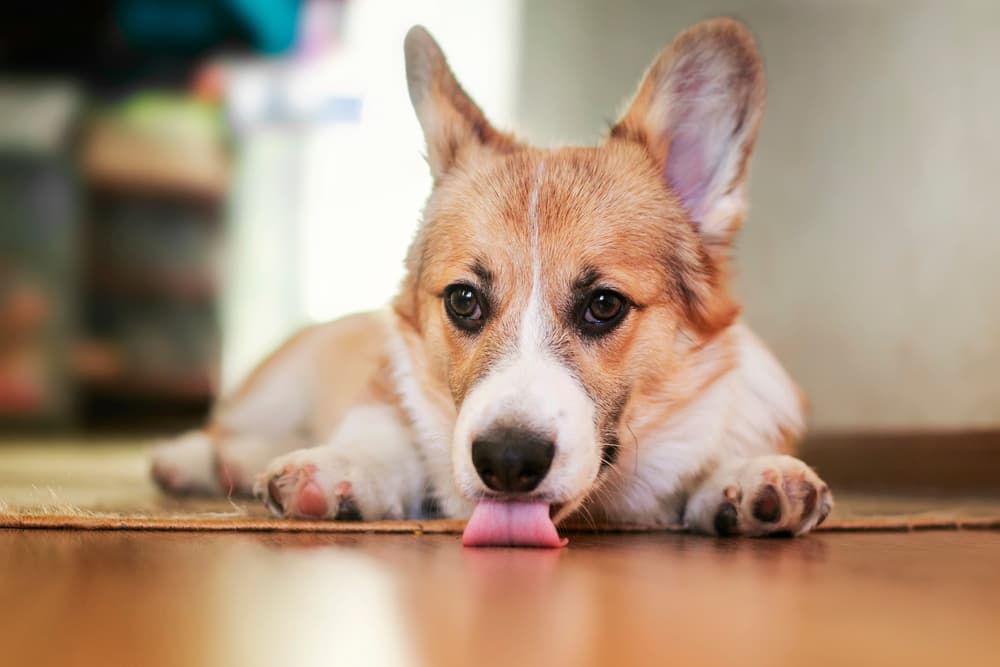Why Do Dogs Lick Blankets and Furniture?
Dogs are known for their curious and sometimes quirky behaviors, and one such behavior that often leaves pet owners puzzled is their tendency to lick blankets and furniture. While it may seem like a harmless habit, there are several reasons why dogs engage in this behavior. Understanding the underlying motivations behind this behavior can help us better care for our furry friends and ensure their well-being.
One possible reason for dogs licking blankets and furniture is their instinctual nature. Dogs have a strong instinct to explore and investigate their surroundings through their sense of taste. Just like how humans use their hands to touch and feel objects, dogs use their tongues to gather information about their environment. Licking surfaces, including blankets and furniture, allows them to gather scents, tastes, and textures, helping them to understand their surroundings better.
Another reason for this behavior could be related to a dog’s need for comfort and security. Licking can be a self-soothing behavior for dogs, similar to how humans may bite their nails or fidget when feeling anxious or stressed. The repetitive motion of licking can have a calming effect on dogs, providing them with a sense of comfort and security, especially when they are feeling uncertain or in unfamiliar surroundings.
Furthermore, dogs may lick blankets and furniture as a way of seeking attention or expressing their affection. Dogs are social animals and often use various behaviors to communicate with their human companions. Licking can be a way for dogs to initiate interaction or show their love and attachment. They may lick blankets and furniture when they feel the need for attention or when they want to bond with their owners.

Why Do Dogs Lick Blankets and Furniture
It is important to note that excessive licking of blankets and furniture can also be a sign of underlying health issues. Dogs may engage in this behavior due to allergies, skin irritations, or even gastrointestinal problems. If you notice your dog excessively licking these surfaces, it is advisable to consult with a veterinarian to rule out any potential health concerns.
In conclusion, dogs licking blankets and furniture can be attributed to their instinctual nature, need for comfort, and desire for attention. By understanding these motivations, we can provide appropriate care and address any potential health issues. In the following sections, we will explore practical recommendations to manage and redirect this behavior, ensuring a happy and healthy life for our canine companions.
The Reasons Behind Dogs Licking Blankets and Furniture
Exploring the Environment
One of the primary reasons why dogs lick blankets and furniture is their instinctual need to explore their environment. Dogs rely heavily on their sense of taste to gather information about the world around them. By licking surfaces, they can collect scents and tastes, allowing them to better understand their surroundings. This behavior is particularly common in puppies who are still in the process of learning about their environment.
Comfort and Security
Licking blankets and furniture can also be a self-soothing behavior for dogs. Similar to how humans may engage in certain habits when feeling anxious or stressed, dogs may lick as a way to calm themselves down. The repetitive motion of licking can provide a sense of comfort and security to dogs, especially when they are feeling uncertain or in unfamiliar surroundings. It can be a way for them to self-regulate and cope with their emotions.
Seeking Attention and Affection
Dogs are social animals and often use various behaviors to communicate with their human companions. Licking can be a way for dogs to seek attention or express their affection. They may lick blankets and furniture to initiate interaction or show their love and attachment. This behavior is often seen when dogs want to bond with their owners or when they feel the need for attention. It is their way of reaching out and connecting with their human family members.
Potential Health Issues
While licking blankets and furniture can be considered normal behavior, excessive licking may indicate underlying health issues. Dogs may engage in this behavior due to allergies, skin irritations, or even gastrointestinal problems. If you notice your dog excessively licking these surfaces, it is crucial to consult with a veterinarian. They can help determine if there are any underlying health concerns that need to be addressed. Treating the root cause of the excessive licking can help alleviate any discomfort your dog may be experiencing.
Practical Recommendations to Manage Dogs Licking Blankets and Furniture
1. Provide Appropriate Chew Toys
One way to redirect your dog’s licking behavior is by providing them with suitable chew toys. Dogs often engage in licking as a way to alleviate boredom or satisfy their natural urge to chew. By offering a variety of chew toys, such as rubber bones or puzzle toys, you can redirect their attention and provide them with a more appropriate outlet for their chewing instincts.

Why Do Dogs Lick Blankets and Furniture
2. Increase Mental Stimulation
Dogs that lick blankets and furniture, a behavior that leads many to wonder, “Why do dogs lick blankets and furniture?” may actually be seeking additional mental stimulation. Engage your dog in activities that challenge their minds, such as puzzle games or interactive toys, to address the question of why do dogs lick blankets and furniture. Mental stimulation can help alleviate boredom and reduce the likelihood of them resorting to excessive licking as a means of entertainment, offering a solution to the query of why do dogs lick blankets and furniture.
Integrating mental exercises into your dog’s routine not only addresses the concern of why do dogs lick blankets and furniture but also promotes a healthier, more engaged lifestyle for your pet. So, when you find yourself puzzled by your dog’s behavior and asking, “Why do dogs lick blankets and furniture?” remember that the answer often lies in providing them with enough mental stimulation to keep their minds active and engaged. This approach can significantly decrease the occurrence of such behaviors, offering a clear answer to the question of why do dogs lick blankets and furniture.
3. Establish a Regular Exercise Routine
Regular exercise is essential for a dog’s overall well-being. Dogs that receive an adequate amount of physical exercise are less likely to engage in destructive or self-soothing behaviors like licking blankets and furniture. Take your dog for daily walks, play fetch, or engage in other physical activities that suit their breed and energy level.
Providing ample opportunities for physical activity not only keeps your dog physically healthy but also mentally stimulated and less inclined to engage in behaviors like Why Do Dogs Lick Blankets and Furniture, which could be signs of boredom or anxiety. By incorporating regular exercise into your dog’s routine, you can help prevent such behaviors and promote their overall happiness and well-being.
4. Create a Safe and Comfortable Environment
Ensuring that your dog has a safe and comfortable environment is crucial to reduce their need for self-soothing behaviors, such as why do dogs lick blankets and furniture. Providing them with a cozy bed or crate where they can retreat to when they feel anxious or stressed is a key step in addressing behaviors like why do dogs lick blankets and furniture.
Furthermore, to mitigate the reasons behind why do dogs lick blankets and furniture, consider using pheromone diffusers or calming sprays to create a more calming atmosphere in your home. These measures can help address the underlying anxieties or stressors that may lead to questions like why do dogs lick blankets and furniture, promoting a more serene and content state of mind for your pet.
5. Consult with a Professional Trainer or Behaviorist
If your dog’s licking behavior, such as why do dogs lick blankets and furniture, persists or becomes problematic, it may be beneficial to seek guidance from a professional trainer or behaviorist. They can assess your dog’s behavior, including the reasons behind why do dogs lick blankets and furniture, and provide specific strategies tailored to your dog’s needs.
A professional can help address any underlying issues related to why do dogs lick blankets and furniture and provide you with the necessary tools to manage and redirect the licking behavior effectively. Understanding why do dogs lick blankets and furniture is crucial in addressing the behavior comprehensively, and a professional’s input can be invaluable in such cases.

Why Do Dogs Lick Blankets and Furniture
6. Regular Veterinary Check-ups
Regular veterinary check-ups are crucial to ensure your dog’s overall health and well-being. If you notice excessive licking or any changes in your dog’s behavior, it is important to consult with a veterinarian. They can rule out any underlying medical conditions that may be causing the behavior and provide appropriate treatment if necessary.
By implementing these practical recommendations, you can effectively manage and redirect your dog’s licking behavior. Remember, patience and consistency are key when modifying your dog’s behavior. With proper care, attention, and understanding, you can help your furry friend lead a happy and balanced life.
Conclusion
In conclusion, understanding the curious behavior of why dogs lick blankets and furniture is crucial for pet owners who wish to ensure the well-being of their furry companions. For a deeper dive into this topic, visit geepets.com, where we explore various canine behaviors and provide insights into their health and happiness.
Additionally, the American Kennel Club (akc.org) offers a wealth of information on dog behavior, training, and care that can help pet owners better understand and manage their pets’ licking habits. By leveraging these resources, you can gain valuable knowledge on how to address and potentially reduce unwanted licking behaviors in your dog.























